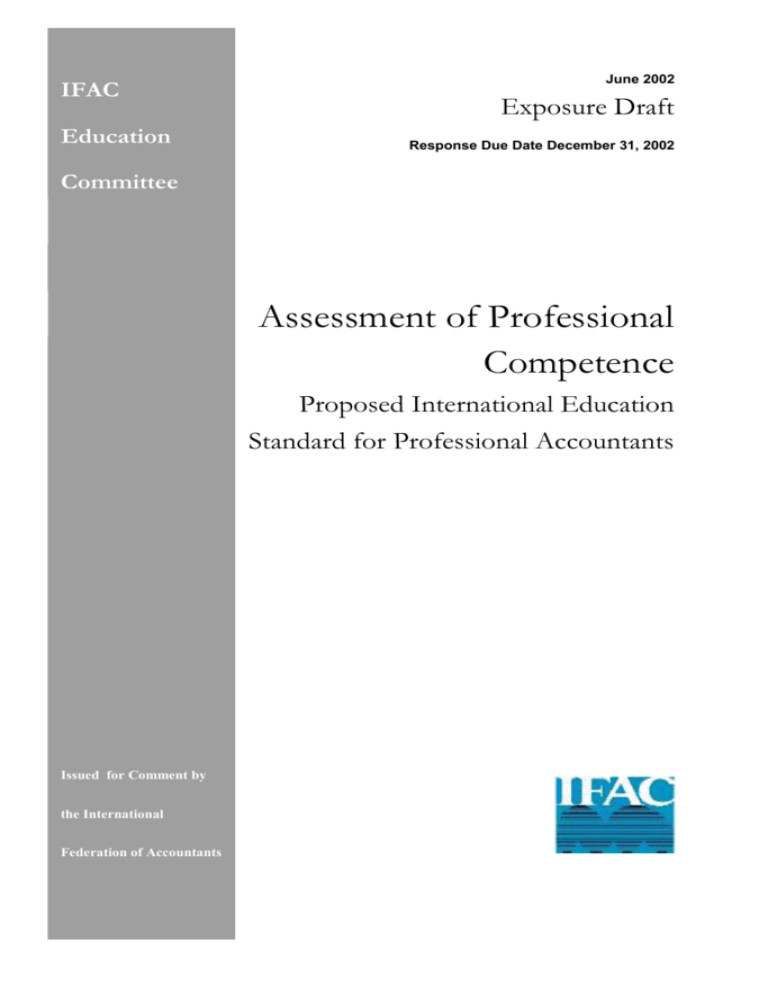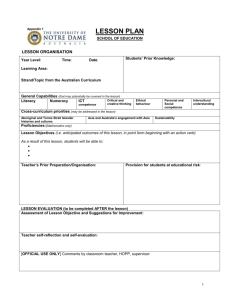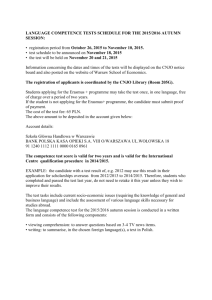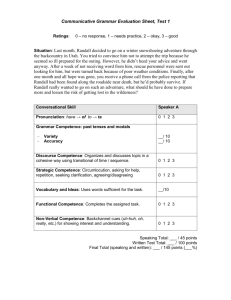
IFAC
Education
June 2002
Exposure Draft
Response Due Date December 31, 2002
Committee
Assessment of Professional
Competence
Proposed International Education
Standard for Professional Accountants
Issued for Comment by
the International
Federation of Accountants
This Exposure Draft was approved for publication in June 2002 by the
Education Committee of IFAC.
The mission of IFAC is the worldwide development and enhancement of
an accountancy profession with harmonized standards, able to provide
services of consistently high quality in the public interest. The Education
Committee’s mission is to serve the public interest by the worldwide
advancement of education and development for professional accountants
leading to harmonized standards.
The Education Committee requests comments on this Exposure Draft.
Respondents are encouraged to comment on the specific questions
attached at the end of this document and any other issues related to this
Exposure Draft. Comments sent by e-mail are preferred but they may also
be submitted by computer disk or in hard copy.
Comments should be received by 31 December 2002.
Comments received by the due date will be reviewed by the Education
Committee and may influence the final Standard. Comments received
before 15 October 2002 will be reviewed by the Education Committee at
its meeting in November 2002. Comments received after that date will be
reviewed by the Committee in March 2003. Comments received after the
due date, and on an ongoing basis, are also welcome. Respondents should
note that comments are considered a matter of public record.
Comments on this publication should be sent to:
Technical Director
International Federation of Accountants
535 Fifth Avenue, 26th Floor
New York, NY 10017, USA
Fax: 212-856 9420
E-mail responses should be sent to: EDComments@ifac.org
Information about the International Federation of Accountants can be
found at its web site, www.ifac.org. Copies of this publication may be
downloaded free of charge from the site.
Copyright © June 2002 by the International Federation of Accountants.
All rights reserved.
CONTENTS
PAGE
PREFACE .......................................................................................... 2
INTERNATIONAL EDUCATION STANDARDS FOR PROFESSIONAL
ACCOUNTANTS ............................................................................. 2
PURPOSE OF THIS STANDARD ..................................................... 2
SCOPE OF THE STANDARD ........................................................... 3
BACKGROUND .............................................................................. 3
DEFINITIONS ................................................................................... 3
EFFECTIVE DATE ........................................................................... 9
FOREWORD ..................................................................................... 9
ACKNOWLEDGEMENTS............................................................... 11
ASSESSMENT OF PROFESSIONAL COMPETENCE .................... 12
DISCUSSION QUESTIONS ............................................................. 14
Assessment of Professional Competence
Preface
International Education Standards for Professional Accountants
1.
International Education Standards for Professional Accountants
(IES) prescribe standards of generally accepted “good practice”
in the education and development of professional accountants.
IES express the benchmarks that member bodies are expected
to meet in the preparation and continual development for
professional accountants. They establish the essential elements
of the education process at a level that is aimed at gaining
international recognition, acceptance and application of the
education process. Hence, member bodies must consider these
prescriptions.
2.
International Education Standards for Professional Accountants
cannot legally override local laws and regulations, but will
provide an authoritative reference for informing and influencing
local regulators regarding generally accepted “good practice.”
3.
International education standards are the paragraphs in bold
typeface in this Standard. Commentary paragraphs, which may
elaborate on and assist in the interpretation of the standard
paragraphs, appear in plain typeface.
4.
The individual standards need to be read in conjunction with
the Guiding Principles for International Education Statements
and the related commentary and implementation material
contained in the Introduction to International Education
Standards for Professional Accountants.
Purpose of this Standard
5.
2
This Standard prescribes the requirement for a process of
assessment of a candidate’s professional competence before
admission to the profession.
Definitions
Scope of the Standard
6.
This Standard prescribes that professional competence be
assessed and that part of the assessment be in recorded form,
either in writing or by computer. Other types of assessment may
also be used where these are appropriate to the competence
being assessed. The monitoring, control and assessment of
practical experience are dealt with in proposed International
Education Standard “Experience Requirements.” Proposed
International Education Standard “Content of Professional
Education Programs” deals with professional education and
proposed International Education Standard “Professional Skills
and General Education” covers professional skills and general
education.
Background
7.
This Standard draws on IEG 9, “Prequalification Education,
Assessment of Professional Competence and Experience
Requirements” (first issued 1991, revised 1996) and
Competence-based Approaches to the Preparation and Work of
Professional Accountants, Discussion Paper (first issued 1998,
revised 2001). Further suggestions are contained in An Advisory
on Examination Administration, Study 1 (issued 1998) and
Specialization in the Accounting Profession, Discussion Paper
(issued 1992). The IFAC Education Committee is also
commissioning further research on assessment methods.
Definitions
8.
Definitions and explanations of the key terms used in the
Standards are set out in the Guiding Principles for International
Education Statements. The terms used in this Standard are
defined as follows. Words marked with an asterisk (*) indicate
terms that are defined elsewhere in this glossary.
Assessment
Refers to all forms of tests of professional
competence,* whether in writing or otherwise,
including examinations.
Candidate
Refers to any individual who is presenting
themselves for assessment as part of an
3
Assessment of Professional Competence
education program in preparation to become a
professional accountant.*
Capabilities
Are the professional knowledge,* skills and
professional values* required to demonstrate
competence.*
Explanation
Capabilities include content knowledge,
technical and functional skills, behavioral skills,
intellectual abilities and professional values and
attitudes.
[Based on Competence-based Approaches to the
Preparation and Work of Professional
Accountants 2001]
Competence
Is being able to perform a work role to a defined
standard, with reference to real working
environments.
Explanation
Competence may be assessed by a variety of
means, including work-place performance,
work-place simulations, written tests of various
types and self-assessment.
[Competence-based Approaches to the
Preparation and Work of Professional
Accountants, 2001]
Development
Is the acquisition of capabilities* which
contribute to competence.*
Explanation
Development refers to the growth of attributes
that contribute to competence, however
achieved. Individuals may develop their abilities
through a wide range of processes such as
learning, including education and training;
experience; reflection; observation or receipt of
4
Definitions
information; other structured and unstructured
learning activities; or through natural growth
over time.
Education
Refers to a systematic act or process aimed at
developing knowledge, skills,* character, or
other abilities and attributes within individuals.
It includes developmental activities commonly
referred to as training.
Explanation
Education is a formal, structured learning
process whereby individuals develop attributes
considered desirable by society. Education is
usually characterized by the growth of an
individual’s mental and practical abilities, as
well as maturing in attitude, resulting in an
enhanced ability of the individual to function
and contribute to society, in either specific or
non-specific contexts. While often conducted in
academic environments, education also includes
formal
learning
processes
in
other
environments, such as on-the-job and off-the-job
training. Education is, by nature, formal and
therefore excludes informal, unstructured
learning and developmental processes. Valuable
learning, training, and development can also
take place in less formal environments through
processes that are not formal or structured
enough to be considered “education.”
Good Practice
Refers to those elements considered essential to
the education* and development* of
professional accountants* and performed at a
standard necessary to the achievement of
competence.*
Explanation
“Good practice” relates not only to the range of
content and processes of education and
5
Assessment of Professional Competence
development programs, but also to the level or
standard at which they are performed (i.e., the
depth and quality of the programs). The IFAC
Education Committee is conscious of the wide
diversity of culture, language and educational,
legal and social systems in the countries of the
member bodies and of the variety of functions
performed by accountants. Different factors
within these environments may vary the ability
of member bodies to adopt some aspects of
“good practice.” Nevertheless, member bodies
should continuously aspire to “good practice”
and achieve it wherever possible.
Post-qualification
Refers to the period after qualification* as an
individual member of an IFAC member body.
Explanation
The term “post-qualification” is usually
associated with activities and requirements
relating to the professional development of those
who have already obtained a professional
qualification. It is often associated with action
relating to the maintenance or further
development of professional competence.
Practical
experience (or
professional
experience)
Is work experience undertaken by a trainee that
is relevant to the work of professional
accountants.* The program of experience is
aimed at developing professional competence*
(including values) within trainees and provides a
means whereby trainees can demonstrate the
achievement of professional competence.
Explanation
Practical experience refers to the on-the-job
execution of tasks that are relevant to the field of
accountancy. The practical experience
component of the qualifying process is intended
6
Definitions
to develop candidates through the direct
application of knowledge, skills and
professional values. Ultimately, it is through
practical experience that trainees will
demonstrate their competence to perform the
roles of professional accountants. Practical
experience is sometimes referred to as
“professional experience” and is synonymous
with that term.
[By reference to the Discussion Paper Practical
Experience, 1998]
Professional
accountant
Refers to those individuals, whether they be in
public practice (including a sole practitioner,
partnership or corporate body), industry,
commerce, the public sector or education, who
are members of an IFAC member body.
[IFAC Code of Ethics for Professional
Accountants, 2001]
Professional
knowledge
Refers to those topics that make up the subject
of accountancy as well as other business
disciplines that, together, constitute the essential
body of knowledge for professional
accountants.*
Professional values
Are the attitudes that identify professional
accountants* as members of a profession. They
comprise principles of conduct generally
associated with, and deemed essential in
defining the distinctive characteristics of,
professional behavior.
Explanation
Professional
values
include
technical
competence,
ethical
behavior
(e.g.,
independence, objectivity, confidentiality and
integrity), professional demeanor (e.g., due
care, timeliness, courteousness, respect,
responsibility and reliability), pursuit of
excellence (e.g., commitment to continual
7
Assessment of Professional Competence
improvement and life-long learning) and social
responsibility
(e.g.,
awareness
and
consideration of the public interest).
Qualification
Qualification as a professional accountant* is
recognition that, at a given point in time, an
individual is deemed to have met the
requirements for recognition as a professional
accountant.
Explanation
Qualification is the formal recognition of an
individual as having attained a professional
designation, or having been admitted to a class
of professional membership, that signifies the
individual is a professional accountant.
Qualification implies that the individual has
been deemed competent in terms of meeting the
requirements prescribed for obtaining
professional accountant status. While the term
“qualification” can be applied to various stages
of professional development and classes of
membership, its usage in IFAC Education
Committee documents (unless otherwise
indicated) relates to the benchmark for
recognition as a professional accountant.
[Based on IEG-9, “Pre-qualification Education,
Assessment of Professional Competence and
Experience Requirements of Professional
Accountants,” 1998]
Skills
Refer to the various types of abilities required to
apply knowledge and values appropriately and
effectively in a professional context.
Explanation
Professional accountants are required to
possess a range of skills, including technical
and functional skills, organizational and
8
Effective date
business management skills, personal skills,
interpersonal and communication skills, a
variety of intellectual skills, and skills in
forming professional judgments.
Specialization
Is the formal recognition by a member body of a
group of its members possessing distinctive
competence* in a field, or fields, of activity
related to the work of the professional
accountant.*
[Discussion Paper Specialization in the
Accounting Profession, 1992]
Effective date
9.
Member bodies should aim to comply with these standards by 1
January 2005. Earlier application is encouraged.
Foreword
10.
The professional competence of candidates should be formally
assessed before they are admitted to the profession. This is
normally in addition to academic qualifications, beyond first
degree (bachelors) level, and can include an assessment of
practical experience. This is because the assessment of
professional competence needs to measure practical application
as well as the underpinning theoretical knowledge provided by
academic study.
11.
Candidates need, for example, to be able to demonstrate that
they:
have a sound technical knowledge of the specific subjects
of the curriculum;
have an ability to apply technical knowledge in an
analytical and practical manner;
are able to extract from various subjects the knowledge
required to solve problems with multiple aspects;
solve a particular problem by distinguishing the relevant
information from the irrelevant in a given body of data;
9
Assessment of Professional Competence
10
are able, in multi-problem situations, to identify the
problems and rank them in the order in which they need to
be addressed;
appreciate that there can be alternative solutions and
understand the role of judgment in dealing with them;
have an ability to integrate diverse areas of knowledge and
skills;
can communicate effectively with users by formulating
realistic recommendations in a concise and logical fashion;
have an appreciation of the ethical applications of the
above.
Acknowledgements
Acknowledgements
The Education Committee thanks the Task Force members who have
contributed to the development of this Exposure Draft:
Country
Czech Republic
Hungary
Israel
Malaysia
Turkey
United Kingdom
Transnational Auditors Committee
Name
Bohumil Král and Jaroslav Louka
József Roóz and Ferenc Eperjesi
Yoram Eden
Dato Abdul Halim Mohyiddin,
Tan Shook Kheng and Albert
Wong Mun Sum
Ercan Bayazitli, Recep Pekdemir
and Masum Türker
David Hunt, Mark Allison, and
Michael Walsh.
Hans Verkruijsse (observer to the
Education Committee)
Membership of the IFAC Education Committee
The following were members of the Education Committee when this
Exposure Draft was approved:
Country
New Zealand
Argentina
Canada
China
Czech Republic
France
Hungary
Israel
Malaysia
Pakistan
South Africa
Thailand
Turkey
United Kingdom
United States
Name
Warren Allen (Chair)
Hector Carlos Ostengo
Shirley Reilly
Shuang Li
Bohumil Král
Alain Burlaud
József Rooz
Yoram Eden
Abdul Halim Mohyiddin
S.M. Zafarullah
Steve McGregor
Usana Patramontree
Masum Türker
David Hunt
Gary Holstrum.
11
Assessment of Professional Competence
Assessment of professional competence
12.
A required component of the process individuals follow to
become qualified as professional accountants is an
assessment administered by, or with substantive input from,
an IFAC member body or regulatory authority. The
assessment should be comprehensive, covering a sufficient
amount of the whole range of knowledge, skills and
professional values. A significant portion of the candidate’s
responses should be in recorded form, either in writing or
by computer. The assessment should be made as near as
possible to the end of the pre-qualification educational
process and fulfillment of the experience requirement.
13.
Competence is defined as being able to perform a work role to a
defined standard with reference to real working environments.
The critical consideration is whether the evidence collected is a
valid, reliable and credible means of establishing whether a
particular aspect of competence has been achieved. Once the
research the IFAC Education Committee intends to commission
has been completed, the Committee proposes to issue further
guidance on what makes up valid and reliable assessment
systems.
14.
The assessment process, which may take a variety of forms,
needs to be appropriate to the knowledge, skills and
professional values being evaluated. The assessment of
professional competence serves several purposes. First,
professional bodies, particularly self-regulatory ones, have a
responsibility to ensure that their members have the competence
expected of them by employers, clients and the public. Second,
individuals who assume responsibility for certain aspects of the
well being of others need to demonstrate their ability to
discharge this responsibility in a competent manner. Third, the
well being of society and the credibility of the profession are
enhanced when only those who meet the profession’s
competency standards are permitted to hold themselves out as
professional accountants.
15.
IFAC acknowledges that the nature of an assessment of
professional competence is the responsibility of its member
12
Assessment of professional competence
bodies and that there is no single preferred method for such an
assessment. Because of the diversity of competences being
evaluated, IFAC members are encouraged to try out a variety of
assessment methods. These methods need to be appropriate to
the competences being evaluated. Member bodies may also
wish to cooperate with other member bodies in making their
assessment arrangements.
16.
The methods adopted will also depend on factors specific to
each member body, including geographical location,
educational and other resources available, the number of
candidates being tested and their backgrounds, experience and
training. To provide an independent basis for the assessment of
candidates’ knowledge, skills and competence, that assessment
needs to assign a significant weighting to answers in writing or
by computer. The assessment might also include elements of
oral and group assessments. Other types of assessment may
simulate or form part of work-place assignments. Appropriate
assessment techniques at the standard expected of professional
accountants are essential to preserve the credibility of the final
test of competence.
17.
Professional competence may also be assessed through a series
of components spread over an individual's education and
experience period. The final qualifying component of the
assessment of professional competence should be administered
at, or near the end of, the individual's education and experience
program leading to membership. The final assessment should
cover a sufficient amount of the body of knowledge, skills and
professional values necessary to demonstrate that the individual
is ready to qualify.
13
Assessment of Professional Competence
Discussion questions
Please reference comments to the relevant paragraph numbers and
provide alternative proposals where applicable.
1.
Do you agree that the member body or regulatory body should
administer an assessment of professional competence (refer
paragraph 12)?
2.
Do you consider this goal is achievable?
3.
Comment on the proposed effective date of 1 January 2005.
4.
Please comment on any other issues.
14







